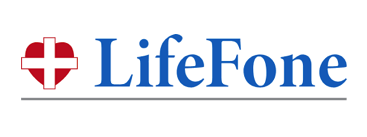| Hours of Research | Companies Considered | Ranking Criteria Evaluated | Finalists Selected |
|---|---|---|---|
| 100+ | 22 | 30 | 10 |
Medical alert systems are valuable, life-saving devices. They can protect seniors in case of emergency, while providing untold peace of mind for caregivers and loved ones. One out of four older adults fall each year in the United States, resulting in numerous injuries and hospitalizations. Medical alert systems give seniors confidence to live independently and trust that help is readily available in the event of a fall or other emergency.
While personal emergency response systems are often used for fall detection, they can also provide a lifeline in case of medical emergencies related to diabetes, heart attack, or stroke. Additionally, they can be activated in case of a fire or burglary. Medical monitoring companies can even help during unforeseen everyday situations, such as inability to get out of the tub.
Today, smartphones and voice-activated devices have created some alternatives for seniors who may need to contact a neighbor or relative in case of an emergency, but professionally monitored systems still have their benefits. No other system provides a direct link to trained operators or emergency contacts along with advanced features like GPS tracking.
Telephone-based monitoring companies emerged in the 1970s, and many providers have been providing services continuously since then. There are also some newcomers that focus on innovative algorithm-based technology and transparent pricing. In fact, more than 580 medical monitoring services are registered with the Better Business Bureau.
Helping Buyers Narrow Down Their Options
To help consumers sift through their options, we’ve created this guide that compares 10 of the top providers based on the quality of their service, equipment options, cost, and overall value. Each company was evaluated, ranked, and given a star rating, and the companies’ profiles give you a detailed look at their ranking and offerings to help you see how these products might fit into your life. We’ve also created a consumer guide that outlines some of the most important purchasing considerations. Finally, we’ve answered some common questions to help you make an informed decision if you decide that a medical alert system is right for you.
How We Chose the Best Medical Alert Systems
One of the challenges of selecting the best medical alert companies is that, particularly on the surface, many of the deals appear similar. To get past this confusion, we identified several traits that the top providers share:
Monitoring Plans
Nearly all companies offer customers the choice of landline or cellular service for in-home monitoring as well as mobile devices equipped with GPS location tracking. Across the industry, it was common to see surcharges for fall detection, wellness calls, and other premium features. If you’re interested in these services, be sure to add $5-$10 to the monthly fee per item when comparing plans.
Response Times
Comparing response times is one of the most effective ways to evaluate service quality. Some providers answered help calls in less than 20 seconds while others took as long as seven minutes. When determining service quality, we looked for companies with multiple U.S.-based call centers and professional operators who have received specialized training.
Reviews and Qualifications
Subscriber satisfaction is another important consideration. We cut one provider from our list because customers had trouble getting their money back after trying the service. Industry certifications from organizations such as Underwriters Laboratories and The Monitoring Association also gave us insight into the provider’s service quality.
Equipment Features
While many providers use nearly identical base units and pendants, we noticed some differences in the product’s battery life and signal range. We also considered the system’s audio quality, weight and appearance while giving preference to devices that were easy to use and maintain.
Ethics
Deceptive pricing schemes and hidden charges booted several companies off our list of contenders. Nearly all of our top picks have monthly service agreements with no long-term commitment, and many offer a 30-day money-back guarantee that gives customers an opportunity to try the service.
In addition to using the above criteria to select the top medical alert companies, we ranked the top twenty providers based on thirty different factors. Each company was awarded a star rating based on this analysis. For more information on our ranking process and the metrics used, read “A Full Explanation of Our Ranking Methodology.”
The 10 Best Medical Alert Companies
| COMPANY | BASE COST | STARTING COSTS | PLANS | FEATURES | STAR RATING |
| MobileHelp | $19.95 — $54.95 | $50.00 One-Time Fee (Mobile Help Classic plan only)
$16 Shipping on select plans |
Landline, Cellular, Bundle | Fall Detection GPS Location Tracking | 5.0/5 |
| LifeFone | $24.95 — $41.95 | 16.95 shipping on select plans, One month free promotion for annual/quarterly plans | Landline, Cellular, Bundle | Fall Detection Medication Reminders Wellness Calls Caregiver Apps | 4.2/5 |
| Bay Alarm Medical | $24.95 — $64.95 | $99 equipment fee (SOS mobile devices), $159 equipment fee (SOS Smartwatch), One month free + free shipping promotion | Landline, Cellular, Bundle | Fall Detection Location Tracking Caregiver Tools | 4.0/5 |
| Aloe Care | $29.99
— $49.99 |
$99.99-$349.99 (one-time hardware fee) | Cellular | Fall Detection, Voice-Activated Calls, Location Tracking Caregiver Apps | 3.8/5 |
| Medical Guardian | $27.45 — $44.95 | $199.95 equipment fee (MG Move devices), $149.95 equipment fee (some Home 2.0 plans) Save 16% by paying annually on all plans, +free month + lockbox + $12.50 Shipping Waived with Annual Subscription | Landline, Cellular | Fall Detection GPS Location Tracking Caregiver App | 3.6/5 |
| Medical Care Alert | $29.95 — $39.95 | $11.95 Shipping, One month free with Annual Subscription | Landline, Cellular | Fall Detection, Caregiver App, GPS Location Tracking | 3.4/5 |
| Medical Alert | $19.95 — $39.95 | $79 One-Time Programming Fee, $24.95 Shipping with Month-to-Month Plan | Landline, Cellular | Fall Detection Caregiver Apps, GPS Location Tracking | 3.3/5 |
| GetSafe | $29.95 | $79-$307 equipment fee | Cellular | Hands Free Voice-Activation Caregiver App |
3.3/5 |
| LifeStation | $32.95 — $51.95 | $99.95 Activation Fee for Sidekick and Sidekick Smart plans, $12.50 Shipping Fee | Landline, Cellular | Fall Detection GPS Location Tracking Caregiver Apps Alexa Integration | 3.1/5 |
| QMedic | $300 — $400 (annual payments only) | None | Landline, Cellular | Activity Tracking GPS Location Tracking Caregiver Dashboard | 2.9/5 |
MobileHelp: 5.0/5 Stars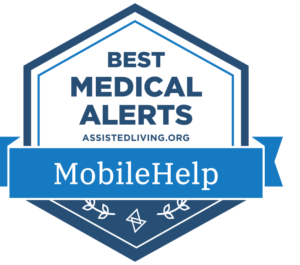
Best for On-Demand Telehealth Services
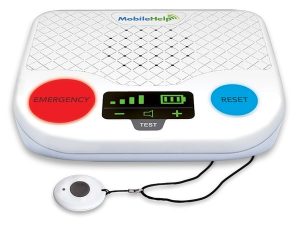
MobileHelp is an industry leader offering eight medical alert systems with numerous premium features and accessories available. While its low prices for high-quality services are noteworthy on their own, MobileHelp recently made its offerings even more useful with the introduction of MDLIVE. MDLIVE is an on-demand telehealth service that allows MobileHelp users to speak with a board-certified physician via phone or video without scheduling an appointment or paying a copay. All MobileHelp customers may add MDLIVE to their service plan for under $10 per month.
MobileHelp’s Star Rating
MobileHelp earned a perfect 5-star rating and ranked first among the top 20 medical alert companies we reviewed. Its number-one spot cannot be attributed to just one thing. MobileHelp scored highly in all ranking categories, and particularly excelled in the In-Home Systems, Availability of Add-ons, and Reliability and Reputation categories, earning a perfect 10 in all three. MobileHelp’s in-home system is the least expensive of all companies we reviewed, and it is one of the very few companies that does not charge an extra fee for a cellular version. In addition, MobileHelp offers a generous free-trial period of 30 days and is extremely transparent about its pricing and policies on its website.
Highlights
- MobileHelp devices have earned a Good Manufacturing Practice seal from the FDA.
- The brand’s medical alert systems have multiple third-party quality certifications.
- MobileHelp is based in Florida and serves customers in all 50 states.
- Dispatch services are provided by Rapid Response, one of the nation’s top monitoring companies.
- LanguageLine connects callers to interpreters specializing in more than 240 languages.
- According to company data, MobileHelp answers an emergency call every 7.5 minutes.
- The company is an accredited BBB member with an A+ rating.
The Takeaway
Whether you’re shopping for in-home or remote coverage, MobileHelp is a strong contender. It’s a great choice if you’re looking for a budget-friendly package that you can share with a partner or spouse and offers a suite of free and paid caregiver tools through MobileHelp Connect.
| Plan | Monthly Price | Starting Costs | Service | Range | Battery Life | Extra Features |
| MobileHelp Classic | $19.95* | $16+ Shipping and $49.95 one- time processing fee with Month-to-Month Payment | AT&T Cellular | 1,400’ | Console: 30 Hours
Pendant: 5 Years |
Optional Fall Detection, Optional Protection Plan, lock box |
| MobileHelp Wired Home | $26.95 | $16 Shipping with Month-to-Month Payment | Landline | 600′ | Console: 30 Hours
Pendant: 5 Years |
Optional Protection Plan, lock box |
| Mobile Help Touch Classic | $54.95 | $16 Shipping with Month-to-Month Payment | Cellular/Nationwide 4G LTE | 600’ | Pendant: 5 Years
Tablet: 24-hour backup |
GPS Location Tracking
Optional Fall Detection, Optional Protection Plan, lock box |
| MobileHelp Solo | $41.95 | $16 Shipping with Month-to-Month Payment | AT&T Cellular | 600’ | 24 Hours | GPS Location Tracking
Optional Fall Detection, Optional Protection Plan, lock box |
| Mobile Help Micro | $39.95 | $16 Shipping with Month-to-Month Payment | AT&T Cellular | Unlimited, where there is AT&T network connectivity | 24 Hours | GPS Location Tracking
Optional Fall Detection, Optional Protection Plan, lock box |
| MobileHelp Duo | $46.95 | $16 Shipping with Month-to-Month Payment | AT&T Cellular | All-in-one Mobile device: UnlimitedSynched Help Button: within : 350’ of mobile device and 1,400’ of console | Mobile Device: 24 Hours;
Help Button: 5 years Console: 30 hrs |
GPS Location Tracking
Optional Fall Detection, Optional Protection Plan, ock box |
| Mobile Help Mobile Duo | $49.95 | $16 Shipping with Month-to-Month Payment | AT&T Cellular | All-in-one Mobile device: Unlimited
Synched help button: within 350’ of mobile device |
Mobile Device: 24 Hours;
Help Button: 5 years |
GPS Location Tracking
Optional Fall Detection, Optional Protection Plan |
| MobileHelp Touch Duo | $54.95 | $16 Shipping with Month-to-Month Payment | Cellular/Nationwide 4G LTE | Tablet: 600’
All-in-one Mobile device: Unlimited Synched help button: Within 350’ of mobile device |
Tablet: 24-hour backup
Mobile Device: 48 hours Help Button: 5 years; |
GPS Location Tracking
Optional Fall Detection, Optional Protection Plan |
-
This promotional first-year rate will increase starting the second year of service up to the full retail price of $43.95 by the third year of service unless you contact the Customer Service team a month before your first year of service ends. You can keep the $19.95 rate only if you specifically request it at this time.
What Customers Like
Customers who researched medical alert systems before deciding on MobileHelp repeatedly comment on the company’s reputation and its many positive online reviews. One customer said, “When I searched for protection systems MobileHelp was listed as number one. A representative called within a few minutes after I requested information. They were very helpful in explaining the system and I decided to buy it.” Others also mention the exceptional customer service, including one customer who stated “Customer Help was excellent. The representative presented the information and options clearly and professionally.”
Learn more about how to get a Medical Alert System from MobileHelp.
What Customers Don’t Like
Negative reviews about MobileHelp most often cite difficulties canceling services. One widow whose husband had subscribed to MobileHelp said, “I returned all the equipment and they are claiming part of it was not sent. It was ALL sent in the same box. Since my husband passed away, they have taken 2 payments from my bank and REFUSE to close the account.” Another customer also said MobileHelp never received any of his returned equipment and continued to bill him months after he returned it.
LifeFone: 4.6/5 Stars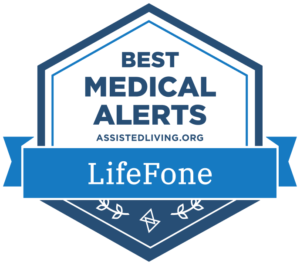
Best for Industry Experience
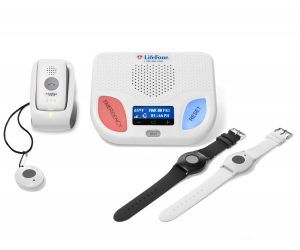 B
B
Based in White Plains, New York, LifeFone has specialized in medical alert services since the 1970s, and it continues to be one of the nation’s leading providers. LifeFone is a top choice for seniors seeking in-home or mobile coverage, and its two-in-one package is a great value. This enduring brand excels in all areas, which is why it’s been recognized by Harvard Medical School and Forbes Health as well as review sites such as TrustPilot.
.
LifeFone’s Star Rating
LifeFone ranked second-highest among the top medical alert systems, with an almost-perfect score of 4.2/5 stars. LifeFone scored in the top 30% in all ranking categories but particularly excelled in Availability of Add-Ons with a score of 10.0. LifeFone was one of only two companies to offer all of the add-ons for which we evaluated, including less-common features like medication reminders and activity tracking. LifeFone also scored highly thanks to its consumer-friendly policies, including a 30-day money-back guarantee, $0 activation fees, and a price-lock guarantee that prevents future rate hikes.
Highlights
- LifeFone has been endorsed by the National Council on Aging and WebMD.
- New customers can take advantage of a 30-day trial.
- Helpful dispatchers respond to calls in approximately 15 seconds.
- The company’s monitoring centers are Five-Diamond and UL-Certified.
- LifeFone has an A+ rating with the Better Business Bureau.
- Free basic protection is available for spouses.
The Takeaway
Established providers sometimes lose their competitive edge, but LifeFone holds its own by offering a comfortable balance of quality and value. Its equipment performs well and its fee structure allows subscribers to save money or purchase optional upgrades, such as daily wellness checks, scheduled phone calls, or medication reminders. In each area, LifeFone provides the level of service that we expect from a top-tier provider.
| Plan | Monthly Price | Starting Costs | Service | Range | Battery Life* | Extra Features |
| At-Home Landline | $24.95 | $16.95 Shipping with Month-to-Month Payment | Landline | 1,300′ | Console: 32 Hours
Pendant: 1-5 Years |
Optional Fall Detection, vanity pendant, Optional Protection Plan |
| At-Home Cellular | $30.95 | $16.95 Shipping with Month-to-Month Payment | Cellular/
4G LTE |
1,300′ | Console: 32 Hours
Pendant: 1-5 Years |
Optional Fall Detection vanity pendant, Optional Protection Plan |
| At-Home & On-The-Go | $36.95 | $16.95 Shipping with Month-to-Month Payment | Cellular/
Nationwide 4G LTE |
All-in-one Mobile Device: Unlimited
Synched Help Button: Within 600’- of Mobile Device or 1,400′ of Console |
Mobile Unit: 24 hours
Console: 30 Hours |
Optional Fall Detection
GPS Location Tracking, Optional Protection Plan |
| At-Home & On-The-Go VIP Active | $39.95 | $16.95 Shipping with Month-to-Month Payment | Cellular/
Nationwide 4G LTE |
Unlimited, where there is AT&T network connectivity | Up to 5 days | Fall Detection
GPS Location Tracking, Optional Protection Plan |
| At-Home & On-The-Go VIPX | $41.95 | $16.95 Shipping with Month-to-Month Payment | Cellular/
Nationwide 4G LTE |
Unlimited, where there is Verizon or AT&T network connectivity | Up to 5 days | Optional Fall Detection
GPS Location Tracking, Optional Protection Plan |
*The battery life for pendants with fall detection may be reduced to approximately 1 year. LifeFone monitors batteries and replaces them for free when they reach below 20% charge. Battery life of mobile devices may vary depending on cellular signal and if fall detection is added or the caregiver app is used.
What Customers Like
Subscribers and their family members frequently mention the positive experiences they have interacting with LifeFone customer service reps and call center operators. One subscriber wrote, “I feel more secure now. I do testing once a month and I get a quick response.” Customers recommend the service and appreciate the security it provides.
What Customers Don’t Like
False activation of the device and a somewhat slow response time are drawbacks mentioned by some reviewers. Other issues subscribers report are rude customer service representatives they encountered when attempting to cancel services or get replacement devices.
Bay Alarm Medical: 4.0/5 Stars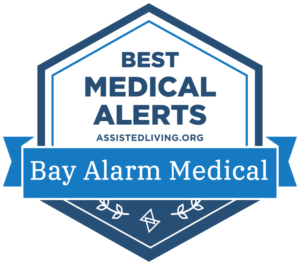
Best for Overall Value
Bay Alarm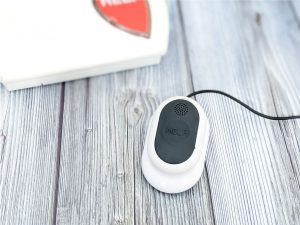 is a longstanding security and medical alert company with more than 70 years of experience. The California-based company offers quality equipment and reliable nationwide service at a competitive price. However, packages that offer Bay Alarm Medical’s industry-leading devices and accessories together at an affordable rate are one of the brand’s strengths.
is a longstanding security and medical alert company with more than 70 years of experience. The California-based company offers quality equipment and reliable nationwide service at a competitive price. However, packages that offer Bay Alarm Medical’s industry-leading devices and accessories together at an affordable rate are one of the brand’s strengths.
Its systems are available as standalone products or in premium packages, which include additional features and add-on devices for a low, bundled cost. These packages make Bay Alarm Medical’s high-quality devices even more affordable, offering consumers incredible value. And when it comes to monitoring credentials, Bay Alarm Medical is among the best. The company works with a USA-based partner to offer support to customers from one of two medical monitoring centers at all times. These two centers meet CSAA Five Diamond Certification requirements as well as UL standards, and if one were to go offline, the other would offer coverage.
Bay Alarm Medical’s Star Rating
Bay Alarm Medical earned a star rating of 4.0/5, making it the third-highest rated medical alert company out of the 22 we ranked and reviewed. The company scored highly in the In-Home Systems and Mobile Systems categories due to its low device prices.. Bay Alarm Medical earned its highest score in the Reliability and Reputation category, which can be primarily attributed to its A+ rating with the Better Business Bureau, extremely well-designed and informative website, and very quick average response time of 10 seconds.
Highlights
- Bay Alarm Medical is an established company owned by one of the nation’s leading security companies.
- Bay Alarm Medical’s monitoring centers meet the industry’s highest quality standards as defined by UL and TMA.
- Discounts are available to members of AARP, USAA and other national organizations.
- Bay Alarm Medical offers a risk-free 30-day trial, and subscribers can cancel at any time.
- Spouses receive free coverage.
The Takeaway
If you want protection that covers you at home and on the go, Bay Alarm Medical offers some of the best bundled rates in the industry. However, the company does have a $5 surcharge for cellular service. Bay Alarm Medical devices give you access to emergency response teams at home, on the road, and nearly anywhere nationwide. Additionally, customers enjoy the peace of mind of working with an industry leader.
| Plan | Monthly Price | Starting Costs* | Service | Range | Battery Life** | Extra Features |
| SOS Home | $24.95 (landline)
$29.95 (cellular) |
Landline: $12 Standard Shipping fee
Cellular: $12 Shipping with Month-to-Month Payment |
Landline (+$5 for Cellular) | 1,000′ | Console: 32 Hours
Pendant: 5 Years |
Optional Fall Detection, Bella bands/charms |
| SOS All-In-One | $39.95-$49.95 | $12 Shipping with Month-to-Month Payment | Cellular/
Nationwide 4G LTE |
All-in-one Mobile Device: Unlimited
Synched Help Button: within 600’ of Mobile Device |
Up to 72 hours per charge | Optional Fall Detection,
Caregiver App/Tracking, Bella bands/charms |
| SOS Mobile | $29.95 – $59.95 (bundle discount) | $99 device purchase fee (all plans) +
$12 Shipping with Month-to-Month Payment |
Cellular/
Nationwide 4G LTE |
Unlimited; Anywhere with AT&T or Verizon network connectivity | Mobile Device: 6-day battery life | Optional Fall Detection,
Caregiver App/Tracking |
| SOS Smartwatch | $34.95 – $64.95 (bundle discount) | $159 device purchase fee (all plans) +
$12 Shipping with Month-to-Month Payment annual plans) |
Cellular/
Nationwide 4G LTE |
Unlimited; Anywhere with AT&T or Verizon network connectivity | 6-18 hours | Optional Fall Detection, Built-in Step Tracker Touchscreen Two-Way Communication |
*Bay Alarm Medical currently offers free shipping for many quarterly and annual plans (excluding the SOS Home system). However, this is subject to change at any time.
**The battery life of standard help buttons is up to 5 years. Auto fall detection buttons have a shorter battery life of up to 2 years. Bay Alarm Medical monitors batteries and notifies customers if a battery is low.
What Customers Like
Bay Alarm Medical’s knowledgeable, patient staff receives overwhelmingly positive feedback. One reviewer shared, “I called this morning to ask a few questions about the recent alarm and was helped in every way possible.” Reviewers also appreciate Bay Alarm’s ease of installation and range of choices. According to one subscriber, “Equipment was easy to set up and easy to use. Testing was easy and emergency response was almost immediate.”
What Customers Don’t Like
There are few subscriber complaints about Bay Alarm. Issues reported include false summoning of emergency services, confusion regarding using the tracking app and moderately long hold times when contacting customer service.
Aloe Care: 3.8/5 Stars
Best for Mobile Systems
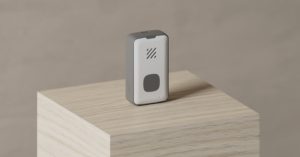
Founded in 2018, Aloe Care Health is one the newest companies in the medical alert system space. However, the company stands out with a good selection of in-home and mobile medical monitoring systems that offer technologically advanced features, including voice activation, a pendant-free fall detection option, and built-in motion sensors. Aloe Care also features a relatively robust Caregiver App that lets caregivers track their loved one’s mobility and check-ins; they can also use the app to call the SmartHub (base station) directly.
Another thing that makes Aloe Care unique is that its base unit comes with built-in motion, temperature, and air quality sensors. Lastly, Aloe Care boasts some of the most visually-appealing in-home and mobile systems that look slick and have excellent build quality.
Aloe Care’s Star Rating
Aloe Care ranked 4th out of the 22 medical alert companies we reviewed, with an overall star rating of 3.8 stars out of 5. It earned high marks in our Availability of Add-Ons category and 1st place in the Mobile Systems category. Aloe Care product packages include common add-ons like wearable fall detection (with a standalone mobile companion), location services, medication reminders, wall buttons, etc., as standard features. Typically, add-on features are additional costs to your initial bill, but not with Aloe Care.
Furthermore, Aloe Care offers a portable cellular device called Mobile Companion, which is wearable as a standalone medical alert system. Although it can’t provide detailed information like the in-home systems, this mobile device offers wearable fall detection (at no extra cost), location updates, and two-way communication. This wearable device is also lower priced than other mobile systems at $29.99 per month, on top of the $99.99 device purchase cost.
Highlights
- Aloe Care is a relatively new medical alert company founded in 2018 and based in New York.
- Aloe Care’s SmartHub has built-in activity, temperature, and air quality, a unique feature among medical alert systems.
- The Mobile Companion package is a standalone wearable fall detection device with a two-way microphone and location tracking feature.
- The SmartHub base unit supports voice activation for emergency calls.
- All Aloe Care packages have a one-time hardware cost ranging from $99 to $349, on top of the monthly monitoring fee.
The Takeaway
Aloe Care Health is your go-to option for in-home and mobile systems with the most high-tech features. Aloe Care’s SmartHub features smart sensors that automatically detect notable changes in movement and alert caregivers of unusual mobility events. Some of the company’s bundled packages also include a Smart Fall sensor that can detect falls in the bathroom using 3D technology and without requiring a wearable pendant. Meanwhile, the Mobile Companion standalone device includes fall detection, and two-way communication will help seniors become more independent and safe when away from home. The company also features a high-quality smartphone app to help caregivers stay in the loop about their loved one’s health and well-being.
| Plan | Monthly Price | Starting Costs | Service | Range | Battery Life | Extra Features |
| Essentials | $29.99 | $149.99 device purchase cost | Cellular/ 4G | Up to 200 ft from Smart Hub (motion detected up to 25 ft away) | 4-6 hours (backup battery), 3 years (care button | Caregiver App, Built-in Sensors |
| Mobile Companion Go | $29.99 | $99.99 device purchase cost | Cellular/Nationwide 4G LTE | Unlimited, anywhere there is AT&T network connectivity | Mobile Device:Up to 5 days3 years (care button | Included Fall Detection,
Caregiver App, Location Tracking |
| Essentials Plus | $39.99 | $249.99 device purchase cost | Cellular/Nationwide 4G LTE | Up to 200 ft from Smart Hub (motion detected up to 25 ft away) | 4-6 hours (backup battery), 3 years (care button | Fall Detection, Caregiver App Location Tracking, Built-in Sensors |
| Total Care | $49.99 | $349.99 device purchase cost | Cellular/Nationwide 4G/4G LTE | Up to 200 ft from Smart Hub (motion detected up to 25 ft away) | 4-6 hours (backup battery), 3 years (care button | Fall Detection, Caregiver App, Location Tracking Built-in Sensors |
What Customers Like
Aloe Care Health mainly received positive customer reviews, especially about its customer support team. One glowing review states, “The Aloe Care Health team is very knowledgeable. They did everything they said and followed up with calls before I even got the product.” Another customer praised the assistance she received with attempting to access the app, saying, “it was so great because their IT team was so helpful and they didn’t give up. When they would come up with ideas and then email me or call me and I would try them.”
What Customers Don’t Like
Negative reviews about Aloe Care are pretty few and far between. One customer complained that the trial period began the day she ordered it. In addition, subscribers complained about the set-up process and some mentioned falls that went undetected.
Medical Guardian: 3.6/5 Stars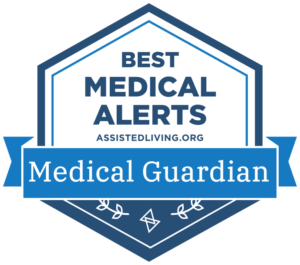
Best Customer Service
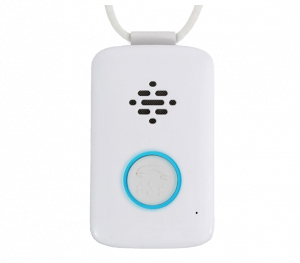
Medical Guardian offers customers five high-quality medical alert device options, including the advanced Freedom Guardian smartwatch. While its wide variety of device options and reputation of reliability would make Medical Guardian a standout company on its own, its top-of-the-line customer service makes Medical Guardian an even more appealing option for buyers. Medical Guardian strives to assist customers every step of the way, from helping them determine which device is the best option for them to providing ongoing support after purchase. The dedicated Customer Care Team is available via phone and live chat to assist customers with any of their needs.
Medical Guardian’s Star Rating
Medical Guardian ranked among the top five of the medical alert companies we reviewed, with a score of 3.6/5 stars. The company scored highly in all categories and excelled in the Availability of Add-Ons metrics. Medical Guardian offers almost all of the add-on devices we researched, including sought-after activity tracking and real-time location tracking. The company also received above-average ratings in the In-Home Systems and Extra Costs categories, contributing to its all-around high score.
Highlights
- Medical Guardian maintains five core values for its business practices: Customers Above All Else, Innovation as our Motivation, Passion for Purpose, Building Meaningful Relationships, and Excellence in Results.
- Medical Guardian’s monitoring center is certified by the Underwriters’ Laboratory and is also The Monitoring Association 5-Diamond Certified.
- Medical Guardian is a member of the Electronic Security Association, acknowledging the company’s commitment to providing excellent service in emergencies.
- All customers receive a free Welcome Kit that includes many helpful items such as a detailed user manual and an EMT information card.
- Medical Guardian’s emergency monitoring services are available in all 50 states, and operators are 100% U.S.-based.
- The company maintains an A+ rating with the Better Business Bureau.
The Takeaway
With five device offerings spanning basic in-home systems to the technologically-advanced smartwatch device, Medical Guardian has a system that will meet almost anyone’s needs. Combined with its commitment to customer support and very detailed website, including a helpful Product Quiz feature to help prospective customers determine which device is best for them, Medical Guardian will be a particularly good choice for first-time buyers of medical alert systems.
| Plan | Monthly Cost | Starting Costs | Service | Range | Battery Life | Extra Features |
| MG Move | $36.62 – $39.95 | $12.50 Shipping (waived with annual payment) +
$199.95 one-time equipment fee |
Cellular/ Nationwide 4G | Unlimited; Anywhere with an AT&T or Verizon network connection | 24 Hours | Optional XL wristband, protection plan, lockbox, 911, OnGuard alerts, Support Circle App |
| Mobile 2.0 | $41.20 – $44.95 | $12.50 Shipping (waived with annual payment) | Cellular/ Nationwide 4G LTE | Mobile device: Unlimited/ Anywhere with an AT&T or Verizon network connection
Synched help button: within 500 ft of mobile device |
3-5 Days | Optional fall detection pendant, wireless wall button, voice-activated wall button, OnGuard alerts, 911, Lockbox, protection plan |
| Mini Guardian | $41.20 – $44.95 | $12.50 Shipping (waived with annual payment) | Cellular/Nationwide 4G | Unlimited;Anywhere with an AT&T or Verizon network connection | 5 Days | Fall detection, protection program, lockbox, OnGuard alerts, 911 |
| Home 2.0 | $34.79 – $37.95 | $12.50 Shipping (waived with annual payment) +
$149.95 one-time equipment fee (waived for annual payment) |
Cellular 4G | 1,400 Feet | 32 Hours of backup power | 911, lockbox, protection plan, OnGuard alerts, black pendant, white combo kit, wireless wall button, voice-activated wall button, fall detection pendant, |
| Classic Guardian | $27.45 – $29.95 | $12.50 Shipping (waived with annual payment) | Landline | 1,300 Feet | 32 Hours of backup power | Optional second pendant (wristband or pendant), fall detection pendant, Wireless wall button, voice-activated wall button, protection plan, 911, lockbox, OnGuard alerts |
What Customers Like
Current and past Medical Guardian customers speak highly of their experience with the company’s products and services. Many mentioned the great customer service and customer service agents’ willingness to assist them. One happy customer described company representatives as “very kind” and able to answer all of her questions. Another highly satisfied customer, whose mother uses a Medical Guardian device, said “They always called me at home to notify me that her device had been activated. Peace of mind… priceless.”
What Customers Don’t Like
Some customers have expressed dissatisfaction with false activation of their equipment and having emergency responders come when they hadn’t pressed the help button. Others mention unexpected fees after canceling service and returning their equipment in excellent condition.
add break
Medical Care Alert: 3.4/5 Stars
Best for EMT/EMD-Certified Phone Operators
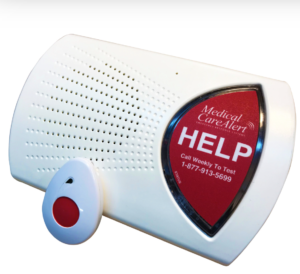
Medical Care Alert is a Michigan-based company that offers two straightforward plans with varying features for different needs in addition to a smart watch medical alert device. Founded in 2008, Medical Care Alert features a simple in-home system, a cellular-enabled help button, and a GPS-enabled smart watch with built-in heart rate monitoring and step tracking. Its in-home and mobile plans may include an optional fall detection device for an additional fee, and built-in fall detection can be enabled for the smart watch system. While it has limited product offerings, Medical Care Alert ensures that the features are listed clearly and that all information is transparent. The company is also known for its US-based alert responders with actual EMT/EMD certification.
Medical Care Alert’s Star Rating
Medical Care Alert is the 6th best medical alert company out of 22 brands we evaluated, with a 3.4/5 star rating. The company received high scores in the Extra Costs and Availability of Add-Ons categories and an above-average performance in the Mobile Systems category. Medical Care Alert scored 9.1/10 in the Extra Costs category, thanks to its transparent pricing, lack of equipment, and free ground shipping for several plans. Meanwhile, it scored 7.4/10 in the Availability of Add-Ons with extra features like fall detection, a lockbox, and a protection plan.
Highlights
- Medical Care Alert is a family-owned and operated company based in Northville, Michigan, and has been in business since 2009.
- All its emergency phone operators are EMT- or EMD-certified and therefore trained in medical monitoring and dispatch.
- In light of an emergency, all Medical Care Alert devices will automatically call and text the people in the user’s emergency contacts list.
- Medical Care Alert offers a wide range of extra features like fall detection, a caregiver app, on-demand location updates, a lockbox, and wall buttons.
- All Medical Care Alert packages may include an optional fall detection device and a free lockbox.
- Medical Care Alert is rated A+ by the Better Business Bureau.
The Takeaway
Medical Care Alert is worth adding to your shortlist of companies if you’re looking for simple but competitively priced medical alert systems or a smart watch with extra high-end features. Medical Care Alert excels with its transparent pricing and no hidden fees. Each of its streamlined plans caters to a specific need, and they’re reasonably priced, with the Smart Watch With GPS plan being the only one that has one-time hardware costs. While there are no discounts on long-term payment plans, customers get a free month plus free shipping for the Annual option. Furthermore, all Medical Care Alert’s phone operators are EMT/EMD-certified, giving subscribers more peace of mind and a sense of security.
| Plan | Monthly Price | Starting Costs | Service | Range | Battery Life | Extra Features |
| Home System | $29.95 | $11.95 shipping (waived for annual plans) | Landline, LTE Cellular (+5/mo) | Standard help button: 1,000 ft
Fall detection pendant: 600 ft Voice range: 30-60 feet |
24 hrs (cellular backup)72 hours (landlinebackup)
Wearable help button: 7 years |
Optional Fall Detection, decorative pendant, wall-mounted buttons, Lockbox |
| Home & Away Ultra | $39.95 | $11.95 shipping (waived for annual and semi-annual plans) | Cellular/ Nationwide 4G LTE | Unlimited, anywhere with an AT&T or Verizon network connection | 72 hours | Optional Fall Detection, Caregiver App, Location Tracking, Lockbox, Extended Protection Plan |
| Smart Watch with GPS | $39.95 | One-time $149.95 device fee + $39.95/mo service fee +
11.95 shipping for month-to-month payment |
Cellular/ Nationwide 4G | Unlimited, anywhere with an AT&T or Verizon network connection | 48 hours | Optional Fall Detection, Caregiver App,
Location Tracking, Lockbox, Extended Protection Plan |
What Customers Like
The majority of current and previous customers of Medical Care Alert have had positive experiences with the company. One reviewer said, “Very professional, courteous, helpful, knowledgeable, trustworthy and reachable. Highly recommend!” Another user commented on how well the devices worked, stating, “clear quick emergency response (~30 sec) during testing, speaker / microphone is clear and can be heard over most of house. The wrist and necklace buttons work over entire house and most of property.”
What Customers Don’t Like
A few unhappy customers struggled with returning the product, and one person claimed that the company charged for damages when equipment had been returned in good condition. Another complained about the installation process and lack of customer support, saying “no dedicated agents are available to answer questions or complaints which is frustrating when you don’t know an answer or just have a question about the product or service.”
GetSafe: 3.3/5 Stars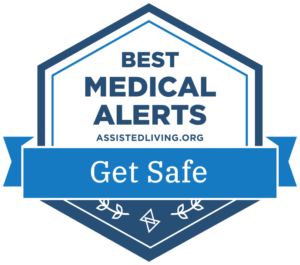
Best for Simple, Hands-Free Protection
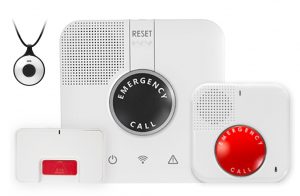 GetSafe takes a different approach to emergency monitoring than other companies in the medical alert industry. Unlike essentially all other medical alert systems which have a wearable component, GetSafe is an entirely hands-free system (though a wearable is included for those who prefer to have a personal alert button on their body).
GetSafe takes a different approach to emergency monitoring than other companies in the medical alert industry. Unlike essentially all other medical alert systems which have a wearable component, GetSafe is an entirely hands-free system (though a wearable is included for those who prefer to have a personal alert button on their body).
Many seniors and their families say that the biggest barrier to emergency protection is getting their loved one to remember or be willing to wear the device every day. GetSafe eliminates this problem by using a combination of voice-activated systems and emergency buttons placed throughout the user’s home, so there’s no need to remember to put on a pendant or wristband each day. GetSafe’s unique approach to monitoring can be the perfect option for those who haven’t had luck with traditional medical alert systems in the past.
GetSafe’s Star Rating
GetSafe secures the eight rank of the top medical alert companies with a score of 3.3/5. While its starting costs can be high, especially for its more comprehensive systems, the monthly monitoring fee is among the lowest of all companies we reviewed. In addition to earning a high score in the In-Home Systems category for its low monthly cost, GetSafe scored highly in the Availability of Add-Ons ranking. All GetSafe users and their families can access an accompanying mobile app for $5 a month, and wall buttons are included with every service package. GetSafe earned its highest score of 9.8/10 in the Reliability and Reputation category with the fastest average emergency call response time (10 seconds) and an easy-to-navigate website with a helpful live-chat feature.
Highlights
- All GetSafe systems are hands-free.
- GetSafe has an affordable monthly monitoring rate of $29.95/mo.
- The system is easy to install and the GetSafe website features helpful installation videos, meaning no installation fees for the customer.
- The certified monitoring center is U.S.-based and operates 24/7.
- GetSafe is A+ rated by the Better Business Bureau
- GetSafe offers a risk-free 30-day trial.
The Takeaway
GetSafe helps fill a hole in the medical alert industry for those for whom wearing a device every single day just isn’t possible. Its products are perfect for seniors who want protection in their homes without remembering to wear a device. GetSafe also offers mobile devices with GPS and fall detection that can be added to any plan, making the company a suitable option for those looking for on-the-go emergency coverage. While its startup costs can be high, especially for larger packages, its low monthly costs help keep costs reasonable overall.
| Plan | Monthly Price | Starting Costs | Service | Range | Battery Life | Extra Features |
| Starter | $29.95 | $79 Equipment Cost + $12 Shipping | Cellular/4G LTE | Voice-Activated Wall Button:10-15ft voice range;
Help Button: up to 1,000 ft from console; 0-1 bedroom system |
console: 32-hour Backup,
Help button: 2- 5 years |
Hands-Free, Optional Fall Detection, Optional Caregiver Tracking, Optional GPS Help Button/ Wall Buttons |
| Standard | $29.95 | $193 Equipment Cost + $12 Shipping | Cellular/ 4G LTE | Voice-Activated Wall Button:10-15ft voice range;
Help Button: Up to 1,000 ft from console; 2-3 bedroom system |
console: 32-hour Backup,
Help button: 2- 5 years |
Hands-Free Optional Fall Detection, Optional Caregiver Tracking, Optional GPS Help Button/ Wall Buttons |
| Select | $29.95 | $307 Equipment Cost + $12 Shipping | Cellular/4G LTE | Voice-Activated Wall Button:10-15ft voice range;
Help Button: Up to 1,000 ft from console; 4-5 bedroom system |
console: 32-hour Backup,
Help button: 2- 5 years |
Hands-Free Optional Fall Detection, Optional Caregiver Tracking, Optional GPS Help Button/ Wall Buttons |
What Customers Like
Customer reviews for GetSafe skew positive, with one customer describing the company representatives as “very helpful.” This same customer also mentions a smooth setup and activation process, saying, “Once the system was set up, the testing process went very well and all monitoring agents were courteous and professional.” Another reviewer who was having issues with a device appreciates that a representative “stayed on the line until the emergency center answered and they verified the unit was working and verified my address. Great job.”
What Customers Don’t Like
Negative reviews for GetSafe found online mention system connection failure and nonfunctioning voice system units. Other complaints mention difficulties with canceling services or reaching a customer service representative.
Medical Alert: 3.3/5 Stars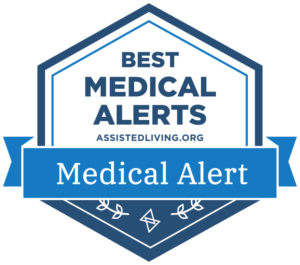
Best for Quality Service With Annual Discounts
Medical Alert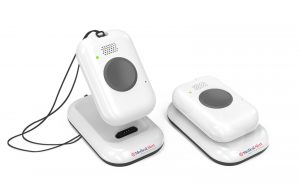 is one of the nation’s largest PERS providers. It’s owned by Connect America, a national company that operates several monitoring firms. Medical Alert offers customers the choice of monthly, semiannual, and annual billing agreements with no long-term commitment. In addition to receiving discounts that can bring monthly costs below $20, customers who select an annual or semiannual plan get extra benefits, such as free shipping and a lockbox that can help emergency responders enter your home. Optional fall detection is available with all plans for a monthly fee.
is one of the nation’s largest PERS providers. It’s owned by Connect America, a national company that operates several monitoring firms. Medical Alert offers customers the choice of monthly, semiannual, and annual billing agreements with no long-term commitment. In addition to receiving discounts that can bring monthly costs below $20, customers who select an annual or semiannual plan get extra benefits, such as free shipping and a lockbox that can help emergency responders enter your home. Optional fall detection is available with all plans for a monthly fee.
Medical Alert’s Star Rating
Medical Alert earned a star rating of 3.3/5, making it the seventh-highest rated medical alert company of the top twenty we reviewed. Medical Alert offers quality devices at a low cost compared to other top companies as demonstrated by its very high scores in the Extra Costs, In-Home Systems, and Mobile Systems categories. In all three categories, Medical Alert ranks the second to third-highest with scores of 8.0 or higher. Its monthly rates for its mobile and in-home systems are among the lowest in the industry, and the costs go down even further when paid for on a semiannual or annual basis. Medical Alert also keeps startup costs to a minimum, only charging a small shipping fee and only $49 for the system activation.
Highlights
- Medical Alert serves customers in the United States, Puerto Rico, and the Virgin Islands.
- UL-certified monitoring centers employ bilingual agents who are fluent in English and Spanish.
- Caregivers can take advantage of the Medical Alert Connectapp, which includes location tracking and notification tools.
- Specially trained SIA-certified operators answer calls in 30 seconds or less and stay on the line until help arrives.
- Medical Alert offers a 100% satisfaction guarantee.
The Takeaway
This Connect America company is impressive with its customer-focused features that benefit seniors and caregivers. It answers calls promptly, provides professional service, and rewards loyal subscribers by offering semiannual and annual billing discounts. The company also offers a range of vanity pendants that resemble designer jewelry.
| Plan | Monthly Price | Starting Costs | Service | Range | Battery Life | Extra Features |
|---|---|---|---|---|---|---|
| At-Home Landline | $22.95 | $15.50 Shipping with Month-to-Month Plan | Landline | 800′ | Console: 30 Hours
Pendant: 2—5 Years |
Optional Fall Detection, Protection Plan |
| At-Home Cellular | $32.95 | $15.50 Shipping with Month-to-Month Plan | Cellular | 800′ | Console: 30 Hours
Pendant: 2—5 Years |
Optional Fall Detection, Protection Plan |
| Mobile System | $42.95 | $15.50 Shipping with Month-to-Month Plan | Cellular | Nationwide | Varies | GPS Location Tracking
Optional Fall Detection, Protection Plan |
What Customers Like
Many subscribers find that Medical Alert gives them greater security and peace of mind. They also appreciate the friendliness of the staff and the company’s fast response when help is needed. One woman shares, “I’ve had Medical Alert for about 12 years … Their reps have all been nice. When I fell in the bathroom, I called them and they answered right away.”
What Customers Don’t Like
A lengthy wait for customer service assistance is one of the few downsides mentioned in reviews of Medical Alert. Other subscribers cite the weight of the device and how easily it’s activated as disadvantages.
QMedic: 2.9/5 Stars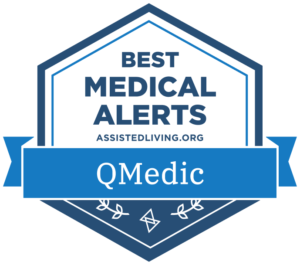
Best for Innovative Features
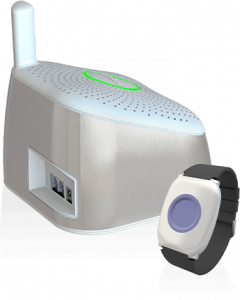 Created by MIT scientists, Boston-based QMedic has taken medical alert technology to the next level. It provides a user-friendly experience for seniors along with advanced features geared toward tech-savvy caregivers. One of the brand’s most unique services is compliance monitoring, which detects whether or not the user is actually wearing their medical alert device.
Created by MIT scientists, Boston-based QMedic has taken medical alert technology to the next level. It provides a user-friendly experience for seniors along with advanced features geared toward tech-savvy caregivers. One of the brand’s most unique services is compliance monitoring, which detects whether or not the user is actually wearing their medical alert device.
Caregivers also have access to an online dashboard that provides a visual overview of the subscriber’s activity levels, including periods of sleep or activity. Automatic alerts notify caregivers when unusual patterns are detected, and algorithms may trigger automated wellness calls. This system is designed to prevent false alarms while providing enhanced peace of mind. QMedic only offers fall detection features to managed care organizations, and not to consumer clients. The company doesn’t recommend automated fall detection and emphasizes the value of nonintrusive activity tracking and passive monitoring.
QMedic’s Star Rating
QMedic earned a score of 2.9/5 stars. Its place in the top ten best medical alert providers can largely be attributed to its advanced device features including compliance monitoring and generous discounts for annual subscribers. And while QMedic has less industry experience than some competitors, its informative and user-friendly website, and A+ rating with the Better Business Bureau contributed to a high score in the Reliability and Reputation category.
Highlights
- QMedic is a leader in passive medical monitoring.
- The company uses proprietary tracking technology developed by MIT experts.
- Alert systems offer excellent performance and onboard self-testing tools that minimize maintenance requirements.
- Calls are routed to two U.S.-based monitoring centers that respond in 30 seconds on average.
- Contracted monitoring centers in Utah and Idaho are certified by UL and TMA.
- QMedic supports active or proactive alerts in addition to wellness calls.
The Takeaway
This service stands out for its user-friendly products, no-nonsense pricing, and innovative technology. We like the simple interface and onboard self-testing function, which provides enhanced peace of mind. However, seniors may need to partner with a relative to take full advantage of QMedic’s suite of activity tracking tools.
| Plan | Monthly Price | Starting Costs | Service | Range | Battery Life | Extra Features |
| In-Home | $300 (annual) | None | Landline, Cellular 4G | 1,000 ft | Console: 24 hr backup
Help Button: 2 Years |
Activity Tracking
Self-Testing |
| Mobile GPS | $400 (annual) | None | Cellular/Nationwide 4G | Unlimited; Anywhere with Verizon or AT&T network connectivity | 30 days | GPS Location Tracking |
What Customers Like
QMedic is highly rated for its reliability and advanced features. Family members in particular appreciate being alerted to unusual sleep or activity patterns, or when their loved one isn’t wearing the device. The uncomplicated set up is also a plus; as one reviewer says, “Set up is really easy. In a nutshell, it’s plug, test and play!”
What Customers Don’t Like
The only downsides mentioned in reviews of QMedic are the lack of an automatic fall detection option for use at home or when on the go and uncomfortable devices that were replaced with alternative options.
LifeStation: 3.1/5 Stars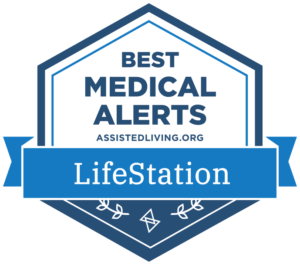
Best for Caregiver Support
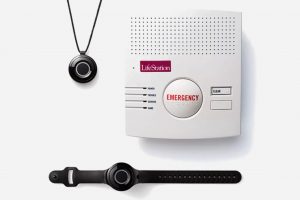
LifeStation has more than 40 years in the medical monitoring business. The brand’s mobile systems include GPS and Wi-Fi tracking capabilities as part of its Find My Loved One feature. “Find My Loved One” allows caregivers to find the exact location of their loved one’s device on-demand, providing peace of mind for caregivers and other loved ones. As of 2024, LifeStation devices are compatible with Amazon Alexa systems, so caregivers can use their Alexa device to access their loved one’s location and other crucial device information. And with a customer service line available until 9pm Monday through Saturday, LifeStation agents are available even after normal business hours to answer any caregiver questions involving their loved one’s medical alert monitoring.
LifeStation’s Star Rating
LifeStation earned a star rating of 3.1/5 stars, making it the ninth-highest rated company out of 22 total contenders. LifeStation received above-average scores in most ranking categories, but its highest was for Availability of Add-Ons. LifeStation offers many of the add-on services and devices we included in our evaluation, including location information on-demand, fall detection, and a device protection plan. Additionally, LifeStation’s in-home and mobile devices were both among some of the least expensive of the companies we ranked.
Highlights
- LifeStation uses UL- and TMA-certified monitoring centers.
- Emergency calls are handled by accent-neutral operators based in the United States.
- Interpretation services support more than 240 languages depending on your preferences.
- There’s no contract, and customers who cancel in the first 30 days receive a full refund minus shipping.
- LifeStation’s tracking service uses GPS, Wi-Fi, and algorithms to pinpoint the subscriber’s location.
- LifeStation provides caregiver tools and integrates with Amazon Alexa.
The Takeaway
In an industry where companies sometimes seem like clones, LifeStation has gone out of its way to develop value-added features and caregiver monitoring functions that separate it from the competition. Response times average around 20 seconds, and best of all, its rates are competitive, especially given the quality of the service.
| Plan | Monthly Price | Starting Costs | Service | Range | Battery Life | Extra Features |
| In-Home | $32.95-$46.95 (bundled services) | $12.50 shipping fee with month-to-month payment | Cellular/Nationwide 4G LTE | 600′ from console | Console: 32 hr backup
Pendant: 4 Years |
Fall Detection and/or Protection plan included in bundled plans |
| At Home | $22.95 | $12.50 shipping fee with month-to-month payment | Landline | 500′ | Console: 32 Hours
Pendant: 4 Years |
Optional Fall Detection |
| Sidekick | $37.95-$51.95 (bundled services) | $99.95 activation fee + $12.50 shipping fee with month-to-month payment | Cellular/Nationwide4G LTE | Unlimited, Anywhere with AT&T network connectivity | 5 Days | Fall Detection and/or Protection plan included in bundled plans, Enhanced Location Services, GPS Tracking |
| Sidekick Smart | $44.95 | $99.95 activation fee +
$12.50 shipping fee with month-to-month payment |
Cellular/Nationwide 4G LTE | Unlimited; Anywhere with AT&T network connectivity | 5 days | Builtin Heart Rate Monitor and Pedometer, Enhanced Location Services, Find My Loved One |
| LifeStation Luxury | $43.95 | $12.50 shipping fee with month-to-month payment | Cellular/Nationwide 4G LTE | 200’ | 1 Year | Stylish pendant, Enhanced Location Services, GPS Location Tracking |
What Customers Like
Customers consistently praise LifeStation’s patient, courteous staff and the system’s ease of use. One subscriber who purchased the smartwatch system commented “reps answered all my questions and they were very personable and concerned about what I needed. It was good.” Another customer praised the cost of services as well as the support she received, saying “LifeStation was more cost-effective from my point of view. Also, their reps were very professional and helpful.”
What Customers Don’t Like
The few negatives subscribers report include being charged before the service is activated and difficulties securing the watch strap as well as discomfort due to the heaviness of the necklace pendant. Another issue noted was difficulties with testing the equipment.
How to Choose a Medical Alert System
Two key considerations when choosing a medical alert system are the type of coverage and extent of protection it provides. In-home systems provide coverage throughout your house and in the yard. Mobile systems offer coverage when you’re on the go. They use a combination of cell phone service and GPS satellites to maintain a constant link between emergency dispatchers and subscribers anywhere in the nation. Mobile and in-home systems are quite specialized, so it’s important to think about the type of coverage you need and what kind of system will work in your environment. Doing so can help you determine which of the following types of systems you need:
- Landline system – Most in-home medical alert systems connect to your existing phone line using a standard telephone jack. They also work with VoIP service. However, this option may not be as reliable due to the need for a consistent internet connection.
- Cellular or mobile system – Cellular systems are ideal for mobile use as well as homes that don’t have a landline. The SIM card is provided by the company, so there’s no extra fee. However, average rates tend to be higher.
- Dual system – Combination systems use separate at-home and mobile devices to provide complete protection no matter where you are. They’re also suitable for sharing with a spouse.
Defining the type of system you need is just the starting point. To ensure that you pick the right medical alert system, it’s important to consider a variety of other factors.
Consider Base Units, Pendants, and Help Buttons
Equipment and device options are fairly standard across the industry, but you still have some choices to make. Most systems have limited aesthetic appeal, and there’s minimal variety between manufacturers. Here are a few of the most common options you can choose from:
- In-home base units feature an emergency help button, paging functions, and built-in speakers that allow seniors to communicate with dispatchers in case of an emergency. Some of these units have voice activation features.
- Emergency response pendants are designed to be carried with you at all times, even in the shower. There are also wearable devices like a watch or necklace and a belt-clip option for men.
- Optional wall- or surface-mounted help buttons can be placed in the bathroom, near a nightstand, in the basement, or in other areas where falls are common.
- Jewelry-style pendants are a newer option available through several providers. They tend to have a shorter transmission range and battery life, but they’re remarkably discreet.
- Mobile monitoring devices, resembling a small flip phone or pager, can be carried in your pocket, clipped on your waistband, or stored in a purse.
Factor in Audio Quality When Selecting Equipment
Audio quality is a make-or-break feature. Unfortunately, it’s difficult to gauge the system’s volume until you have the unit in your house. Sound levels for most in-home systems range from 60 to 80 decibels, which can affect your ability to communicate with operators, especially from a distance. If you have hearing concerns, it’s important to select a provider that offers a 30-day money-back guarantee in case the system doesn’t meet your needs.Investigate Battery LifeBattery life is another important consideration that can influence your choice of system and devices. Here are some factors to consider:
- In-home base units plug into a standard electrical outlet and are equipped with emergency battery packs. If you live in an area that’s prone to power outages or severe weather, select a model that provides at least 30 hours of backup power.
- Traditional push-button pendants and wristbands use stable lithium-ion batteries that may last up to 7 years depending on the model. Some providers even measure battery levels during self-tests and send replacements as needed.
- Mobile devices with advanced features, such as two-way voice communication and GPS tracking, may need recharging every few days or weeks depending on the system’s design and features.
To help you compare the available options, you should also ask yourself how often you want to recharge your device. Do you prefer simple features if they extend the battery life, or are you comfortable recharging the device often so that you’re protected when you’re driving, traveling, and running errands?
Think About Service Plans
Medical alert companies typically sell their monitoring service for a fixed monthly rate and provide customers with equipment to use during that time. Most providers offer basic packages for one price and à la carte upgrades at an additional cost. For example, with an in-home system, you’ll receive a base unit and a wristband or neck pendant. If you want extra pendants or help buttons, you’ll typically pay $3-$5 extra per button, per month. Understanding what you get with a plan and the extras you need makes it easier to compare offerings and prices from different companies.
Basic plans generally include:
- Cellular service for in-home or mobile systems
- One base unit for in-home plans
- The first pendant or wristband
With most providers, you pay extra for:
- Landline phone service
- Equipment that’s lost or damaged
- Additional help buttons or pendants
Compare Fee Structures and Pricing Plans
In the past, some companies locked customers into ironclad three-year contracts that could only be canceled in extreme situations, such as nursing home placement. Mercifully, the industry has moved away from this model. Most top-rated providers offer month-to-month service agreements that you can cancel at any time and there are no penalties as long as you return the equipment.
If you sign up for quarterly or annual billing, many companies give you discounts and extra benefits, such as free device protection or a lockbox for emergency responders. Just make sure that the company offers prorated refunds if you decide to cancel. With so many providers competing for your business, there’s really no need to go with a company with hefty activation fees or cancellation penalties.
Did You Know? Seniors can receive free quotes for personal safety monitoring, medical alerts and wander prevention services for those with Alzheimer’s. Receive a quote here.
Decide on Extra Features and Add-Ons
Standard service plans include 24/7 monitoring and basic equipment, but companies offer numerous upgrades. Here are a few of the most popular value-added features to look for:
- GPS tracking allows emergency operators to pinpoint the subscriber’s exact location in case of an emergency. This feature is ideal for seniors with Alzheimer’s or wandering concerns.
- Fall-detection functions use accelerometers and algorithms to detect unusual movements. This enhanced feature costs $5-$10 per month. Technology is improving, but it still has limitations.
- Caregiver dashboards that display activity and tracking information are ideal for tech-savvy relatives who want a convenient, unobtrusive way to check on loved ones.
- Medical alert systems can also be used as a daily wellness tool. For a nominal fee, many providers offer medication reminders and daily check-in functions.
- As technology improves, more providers are developing mobile emergency response apps and voice-activation tools that can interact with Alexa and home automation devices.
Define Your Emergency Response Needs
Medical alert systems and other Personal Emergency Response Systems (PERS) are designed to get you help when you need it while preventing false alarms the rest of the time. If you activate the help button, a specially trained operator will answer your call in a matter of seconds. Communication is handled through the base unit, but you can also choose a pendant with two-way voice capabilities.
Suppose you cannot communicate with the dispatcher due to medical reasons or the location within your home. In that case, the operator will contact emergency responders and treat the situation as a genuine emergency.
Nearly all companies allow subscribers to create a customized plan that instructs operators to contact a friend, relative, or neighbor before calling 911. In many cases, contacting a neighbor or relative is much more convenient and appropriate than the police or emergency medical services
Companies are also moving toward passive monitoring systems that use smart technology to detect unusual movement patterns and trigger automatic wellness calls. If these are the features you want, it may narrow down your choice of systems and providers.
Weigh Provider Credentials
To help you determine if a medical alert company provides timely, reliable service that will meet your needs, be sure to check these four credentials:
- Average response times – Ideally, the company should answer emergency calls in one minute or less. You also want to find a provider that offers consistent service around the clock.
- Qualifications – Industry certifications can help you evaluate a provider’s commitment to quality service. TMA’s Five Diamond certification is one of the most rigorous. Underwriters Laboratories, Factory Mutual, and the Electronic Security Association also offer third-party quality assurances.
- Monitoring centers – Look for providers that have at least two onshore facilities. The best providers invest in operator training programs and often employ a nurse, EMT, or medical supervisor who can assist during high-priority calls.
- Language – For most consumers, U.S.-based operators are ideal. However, if English isn’t your first language, look for providers that employ bilingual agents or offer third-party interpretation services. Some companies support more than 200 languages.
Match a Medical Alert System to Your Particular Needs
Medical monitoring is a unique industry. The products are very similar, yet one small feature can determine whether or not the system can work for you. As you start the comparison process, identify your main requirements and any special features that you may need. Decide whether you want landline or cellular service. If you want mobile coverage, find out whether AT&T or Verizon works best in your area. Next, determine what features are important to you. Do you care about long battery life, or would you prefer a pendant that looks like an artisan necklace? As you consider the product’s features and functionality, one or two clear contenders will emerge. You can also learn more about each provider by checking online reviews to see how the system worked for customers in a similar situation.
If you’ve considered medical alert systems before but were overwhelmed by the number of options and underwhelmed by the lack of convenient features, rest assured that the technology has improved. It’s less intrusive and more user-friendly than it was in the past. Consumers today have more options than ever, and we hope that this guide helps you find the right one for your lifestyle.
A Full Explanation of Our Ranking Methodology
We ranked the top 22 medical alert companies on the market today on factors including price, availability of premium features, company history, and reputation. In total, we evaluated five main categories (metrics) and 30 subcategories (sub-metrics). Metrics and sub-metrics were weighted in proportion to how much of an impact that specific metric has on customers’ experience and bottom line. A full explanation of the metrics and sub-metrics involved in our data-driven analysis can be found below.
Extra Costs
We considered any costs users may face outside of their standard monthly monitoring fees. This includes startup fees such as activation and installation, as well as cancellation fees, shipping fees, and additional costs for common extra features. While these extra costs can add up with some companies, this metric accounts for just 10% of our rankings because they are typically one-time expenses and thus do not have as much of an impact on a user’s expenses overall. The sub-metrics are as follows:
- Device/Equipment Fee: Does the company charge a one-time fee to lease or purchase the medical alert device itself, and if so, how much?
- Activation/Installation Fee: Does the company charge a mandatory one-time fee to activate or install the device, and if so, how much?
- Shipping Fee: How much do most customers pay for shipping (excluding sales, specials, discounts for longer payment periods, etc.)?
- Fall Detection: How much extra per month does the company charge for automatic fall detection?
- Cancellation Fees: Does the company charge cancellation fees when users choose to end their service? We measured this sub-metric in terms of “yes” or “no.”
- Prorated Refunds: Do customers who choose to end their service before their subscription period has run out (i.e., six months into an annual payment) receive a prorated refund for unused months? We measured this sub-metric in terms of “yes” or “no.”
In-Home Systems
This metric evaluated a company’s in-home systems based on both cost and features. Because one’s monthly monitoring payments make up the majority of total medical alert costs, this metric was weighted at 25%. The sub-metrics are as follows:
- Monthly Cost: How much do customers have to pay each month for standard emergency monitoring services? We always used the regular monthly price- not the annual or semi-annual prices, which are often discounted. If a company offers more than one in-home device, we chose the least expensive option.
- Available Discounts: Does the company offer any discounts on the monthly monitoring fee for quarterly, semi-annual, or annual subscribers? We measured this sub-metric in terms of “yes” or “no.”
- Extra Fee for Cellular In-Home: How much extra does it cost per month to use this system with a cellular connection rather than a landline?
- Range: How far can users travel from their base station and still be protected by their medical alert system?
- Showerproof: Can users wear their device in the shower, where falls are common? We measured this sub-metric in terms of “yes” or “no.”
Mobile Systems
Similar to the In-Home Systems category, the Mobile Systems ranking category focused on the devices’ monthly cost and features. Because the monthly monitoring cost and features available with one’s device have a major impact on customer experience, this metric was weighted at 25%. The sub-metrics are as follows:
- Monthly Cost: How much do customers have to pay each month for standard emergency monitoring service? Again, if a company offers more than one device at different costs, we chose the least expensive option.
- Available Discounts: Does the company offer any discounts on the monthly monitoring fee for quarterly, semi-annual, or annual subscribers? We measured this sub-metric in terms of “yes” or “no.”
- Battery Life: How long does the device’s battery last in between charges?
- Water-Resistant? Can users wear their device in the rain, and is it okay if it gets splashed? We measured this sub-metric in terms of “yes” or “no.”
Availability of Add-Ons
Add-on devices and features are an important element in determining a customer’s satisfaction. Even those who are only interested in basic add-on devices, such as a lockbox or wall-mounted button, will benefit from a company that offers these devices along with medical alert systems all in one shop. For those who need specific add-on features like medication reminders, the decision of which medical alert company to choose may rely solely on whether the company offers the needed service.
Because the availability of add-ons can influence a customer’s decision, this category is weighted at 20%. The goal of this ranking category was to evaluate the availability of these devices and features rather than their costs, and thus was measured using a yes/no system. The add-ons that we included in this ranking category (the sub-metrics) are as follows:
- Fall detection
- Lockbox
- Wall buttons
- Device protection plan
- Caregiver portal/app
- Location information on-demand (location tracking for caregivers)
- Medication reminders
- Activity tracking
Reliability and Reputation
Factors like cost, device battery life, and availability of desired add-on features are all tangible things that certainly impact a customer’s satisfaction with their medical alert company. But, other intangibles also can have a great impact on a user’s experience. In our Reliability and Reputation metric, we examined those intangibles that impact customer satisfaction and safety. Because of this impact, Reliability and Reputation was weighted at 20% of a company’s total score. The sub-metrics are as follows:
- BBB Rating: What is the company’s Better Business Bureau rating?
- BBB Review Score: What is the company’s average score from consumer reviews on the Better Business Bureau website?
- Monitoring Center Certified by 3rd Party: Does the company’s monitoring center(s) have certifications and ratings from third-party safety organizations? We measured this sub-metric on a yes/no basis.
- Free Trial Period: Does the company offer new users a free trial period and, if so, how long is the trial?
- Average Response Time: How long does it take, on average, for a user to speak with an emergency operator after pressing their medical alert emergency button?
- Transparency/Ease of Finding Information on Website: Is the company’s website informative and user-friendly? Are prices, extra costs, and policies clearly explained on the website? Is it easy to find the information most important to customers? This sub-metric was measured on a scale from 1-10, with 10 being the most transparent and informative website.
- Years in Business: For how many years has the company provided medical alert systems and services?
Financial Assistance for Seniors Buying Medical Alert Systems
Medical alert systems are a great option for seniors who desire to age in place. Whether they are fully independent and lead an active lifestyle, live with a high-risk medical condition, or face Alzheimer’s or dementia, medical alert systems help put seniors and their loved ones at ease. However, many cannot afford the high costs of these systems. Fortunately, financial assistance options are available to provide seniors with free or low-cost medical alert systems.
Select Medicare Advantage and Medicaid programs offer help covering costs, and the VA has also partnered with some medical alert system manufacturers to provide a free option for veterans. Additionally, other national and state-run organizations offer assistance in covering the cost for low-income seniors and seniors with disabilities.
This guide equips seniors with in-depth information, eligibility and application details to receive a medical alert system at a free or reduced cost.
Medicare Coverage of Medical Alert Systems
Original Medicare (Part A and Part B) cover some durable medical equipment and supplies, but medical alert systems are not included in that category. However, select Medicare Advantage plans (Medicare Part C) may cover medical alert systems. Approved by Medicare, these private insurance plans typically provide the same coverage as Original Medicare – but with extra benefits like dental care and in some cases, medical alert systems. For example, UnitedHealthcare Medicare Advantage members are eligible to receive a medical alert device at no cost.
It’s important to keep in mind that Medicare Advantage plans vary depending on which state you reside in, so be sure to check the plan’s medical alert system coverage in your state. In addition, you must already have Original Medicare (Part A and Part B) in order to be eligible for a Medicare Advantage plan. Find and compare plans in your area using Medicare’s Plan Finder. Once you’re ready to join, enroll on the plan’s website, fill out and return a paper enrollment form, or call the plan directly.
Medicaid Coverage of Medical Alert Systems
Medicaid refers to medical alert systems as Personal Emergency Response Services (PERS), and seniors with this insurance type may be eligible for PERS financial assistance.
With four distinct programs that may provide funding to go toward a medical alert device, there are options for seniors seeking help with this important purchase. Keep in mind that different states often have unique names for the programs below:
- Home Community Based Services (HCBS) Waivers or 1915(c) Waivers: To help provide Medicaid recipients with the resources they need to age in place, most states offer HCBS waiver programs. Each state has its own unique waivers, so the benefits often vary. However, many waiver programs cover expenses for personal alert services, including monthly service fees and one-time setup fees (approximately $25-$75/month and $40-$200, respectively).
- Consumer Directed Services: Medicaid enrollees are given Consumer Directed Services funding to help cover the cost of assistive care, but the specifics regarding the type of care are left mostly open-ended for seniors to decide how to use the funds. Therefore, many choose to use this as an opportunity to pay for a medical alert system and ongoing monitoring.
- Money Follows the Person (MFP): The goal of the MFP program is to assist Medicaid beneficiaries who wish to move out of a nursing home and back into their own home or the home of a caregiver. To this end, the program offers funding for assistive technology, home modifications, and other resources including personal emergency response services.
- Personal Care Attendant (PCA): PCA programs are standard Medicaid entitlement programs that provide eligible seniors with funding similar to the amount of HCBS Waivers in order to safely age in place, rather than in an institutional setting. This includes coverage for medical alert devices.
Since Medicaid is funded jointly by federal and state governments, there are often different policies and coverage for various states. Visit your state’s Medicaid website or contact the local office to inquire about the above programs and take steps toward receiving your medical alert system.
| State | State Medicaid Website | State Medicaid Contact |
| Alabama | medicaid.alabama.gov | 334-242-5000 |
| Alaska | health.alaska.gov | 800-780-9972 |
| Arizona | azahcccs.gov | 855-432-7587 |
| Arkansas | humanservices.arkansas.gov | 855-372-1084 |
| California | medi-cal.ca.gov | 800-541-5555 |
| Colorado | healthfirstcolorado.com | 800-221-3943 |
| Connecticut | portal.ct.gov/husky | 800-842-1508 |
| Delaware | dhss.delaware.gov | 800-464-4957 |
| District of Columbia | dc.gov/service/medicaid | 202-645-4614 |
| Florida | myflorida.com/Medicaid | 877-711-3662 |
| Georgia | medicaid.georgia.gov | 404-651-9982 |
| Hawaii | medquest.hawaii.gov | 808-524-3370 |
| Idaho | idmedicaid.com | 877-456-1233 |
| Illinois | illinois.gov/hfs | 800-843-6154 |
| Indiana | in.gov/medicaid | 800-457-4584 |
| Iowa | dhs.iowa.gov/ime | 855-889-7985 |
| Kansas | kdhe.ks.gov | 800-792-4884 |
| Kentucky | chfs.ky.gov | 800-635-2570 |
| Louisiana | ldh.la.gov | 888-342-6207 |
| Maine | maine.gov/dhhs | 207-287-3707 |
| Maryland | health.maryland.gov | 877-463-3464 |
| Massachusetts | mass.gov | 800-841-2900 |
| Michigan | michigan.gov/mdhhs | 800-642-3195 |
| Minnesota | mn.gov/dhs | 651-431-2700 |
| Mississippi | medicaid.ms.gov | 800-421-2408 |
| Missouri | mydss.mo.gov | 800-735-2466 |
| Montana | medicaidprovider.mt.gov | 800-362-8312 |
| Nebraska | dhhs.ne.gov | 855-632-7633 |
| Nevada | medicaid.nv.gov | 800-992-0900 |
| New Hampshire | dhhs.nh.gov | 800-852-3345 |
| New Jersey | nj.gov | 800-356-1561 |
| New Mexico | nmmedicaid.portal.conduent.com | 888-997-2583 |
| New York | health.ny.gov | 800-541-2831 |
| North Carolina | medicaid.ncdhhs.gov | 800-662-7030 |
| North Dakota | nd.gov/dhs | 800-472-2622 |
| Ohio | medicaid.ohio.gov | 800-324-8680 |
| Oklahoma | oklahoma.gov | 800-522-0310 |
| Oregon | or-medicaid.gov | 800-527-5772 |
| Pennsylvania | dhs.pa.gov | 800-692-7462 |
| Rhode Island | dhs.ri.gov | 401-462-5300 |
| South Carolina | scdhhs.gov | 888-549-0820 |
| South Dakota | dss.sd.gov | 800-597-1603 |
| Tennessee | tn.gov/tenncare | 800-342-3145 |
| Texas | hhs.texas.gov | 877-541-7905 |
| Utah | medicaid.utah.gov | 800-662-9651 |
| Vermont | dvha.vermont.gov | 800-250-8427 |
| Virginia | dmas.virginia.gov | 804-786-7933 |
| Washington | dshs.wa.gov | 800-562-3022 |
| West Virginia | dhhr.wv.gov | 800-642-8589 |
| Wisconsin | dhs.wisconsin.gov | 800-362-3002 |
| Wyoming | health.wyo.gov | 866-571-0944 |
Veterans Resources for Medical Alert Systems
The U.S. Department of Veterans Affairs works with certain medical alert system companies to provide veterans with free at-home and mobile alert devices for their protection. To begin the process, make an appointment with your local VA medical center or outpatient clinic to discuss your desire for reliable, quick care in case of medical emergencies or falls. After your provider verifies your need for a medical alert system, they will typically contact the company to order the device on your behalf.
Keep in mind that many medical alert companies also offer special discounts for veterans. Since you might not always see these listed online, be sure to call the company to identify yourself as a veteran and ask about discounts.
There are three companies currently partnering with the VA to provide veterans with free medical alert devices. Read below for a brief overview of the systems offered and company contact information.
LogicMark
Contracted with the U.S. General Services Administration (GSA), LogicMark offers its GuardianAlert911 Plus medical alert system at no cost to veterans. This water-resistant device gives protection inside and outside the home with its two-way voice communication pendant. It provides 4G LTE coverage to connect quickly with 911 operators, and no landline is necessary.
Contact LogicMark at 866-541-8387 with any questions regarding your ability to receive a free GuardianAlert911 Plus device through veterans benefits, or send an email to [email protected].
MedEquip Alert
MedEquip Alert provides its GSA-approved Personal Emergency and Medical Alert Device for free to veterans. Simply press an SOS button when an emergency occurs, and prepare to automatically connect with a monitoring center on a built-in, two-way speaker. From there, an operator with your name, address and phone number already on hand will dispatch emergency assistance to your location and contact your loved ones if needed.
To receive your free MedEquip Alert device, ask your local VA medical provider to complete the order for you by submitting a consult to MedEquip Alert using GSA# GS-35F-202GA. Call the company at 844-435-7808 with any questions.
Latitude USA
Also contracted with GSA, Latitude USA is proud to offer its Mobile Alert device at no cost to veterans. This at-home and on-the-go system is unique because it features built-in automatic fall protection. Using 4G LTE and GPS tracking, users can speak with up to six emergency contacts including “911” to quickly connect with the help they need in an emergency.
To begin the process of receiving your free Latitude Mobile Alert, reach out to your VA medical provider. Latitude USA is available to answer questions at 1-866-205-4872.
Additional Financial Assistance Resources for Medical Alert Systems
Charities, non-profits, and other organizations are a great resource when seeking financial assistance for medical alert systems. Some offer free or discounted devices, while others connect seniors to local organizations willing to help.
| Organization | Services | Next Steps |
| AAA (Area Agencies on Aging) | Through its nationwide network, AAA connects seniors with resources to increase their independence and dignity. This includes assistance with accessing aging-in-place supports, like medical alert systems. | Locate your local AAA by entering your zip code, city, or state into the search engine on the Eldercare Locator website, or call an Eldercare Locator representative at 1-800-677-1116. |
| National Council on Aging (NCOA) | NCOA partners with
programs all over the U.S. that aim to help seniors. Many of these programs focus on providing resources for those aging in place, such as medical alert devices. |
Use the NCOA map to search and locate a partner or program that’s nearest to you, or use the NCOA Contact page to submit any questions. |
| AARP (American Association of Retired Persons) | AARP has partnered with Lifeline to offer its medical alert system at 15% off for all AARP members. This offer also includes free shipping and device activation. | If you’re already an AARP member, enter your member number on Lifeline’s website to verify your eligibility for this offer. Visit the AARP website to become a member or call AARP at 1-800-566-0242. |
| State Assistive Technology Programs | Offered in most states, assistive technology programs provide discounted or refurbished assistive technologies, like medical alert systems, to individuals with any type of disability, functional limitation or chronic health condition. | Locate your state on the State Assistive Technology Program Directory to view available programs and contact information. |
| Touch the Future | Touch the Future is a non-profit dedicated to providing seniors and individuals with disabilities with affordable assistive technology and other tools they need to live independently. | Visit the Touch the Future website to set up a crowdfunding project, request donations, apply for a grant, or check out the online store for discounted assistive technology. Call Touch the Future at 770-934-8432 with questions. |
Frequently Asked Questions
Are Medical Alert Systems Expensive?
Medical alert systems typically cost between $20 to $55 per month or about $1-$2 per day. Basic in-home systems with one pendant and a push-button base unit are the most affordable option. Mobile systems that include GPS tracking cost more, but their advanced capabilities can benefit active seniors, travelers, and adults who are at risk of wandering. With fall detection and other add-ons, monthly costs can climb as high as $90. However, seniors may be able to save by signing up for annual or semiannual billing, and affinity discounts may be available to members of national organizations, such as AAA and USAA.
Will My Insurance Pay for a Medical Alert System?
Despite the proven benefits, most health insurance plans don’t cover the cost of personal emergency response systems. If you’re 65 or older, basic Medicare (Part A and Part B) doesn’t cover the cost of medical alert systems, but some Part C Medicare Advantage Plans do provide this value-added benefit. Coverage is sometimes available to homebound individuals who receive in-home care or self-directed services through Medicaid if the device helps them live in the community safely.
Do I Need to Purchase Special Equipment?
Usually, no. The majority of medical alert companies include the cost of equipment in their monthly monitoring fees. In other words, there’s usually no upfront charge for the device, but you may have to pay if the equipment is lost or damaged or if you fail to return it after you cancel your plan. If you’re purchasing equipment upfront, determine whether it’s self-monitored or tied to a certain provider.
How Long Do the Batteries Last?
Batteries in medical alert systems last anywhere from 24 hours to 7 years depending on the technology and design. GPS-enabled systems with two-way voice communication have the shortest battery life, especially when connecting to remote cell towers in rural locations. Most in-home base units remain active for up to three days without power. Lithium-ion batteries used in pendants and push buttons generally last for several years.
What Type of Phone Service Do I Need?
Nearly every medical alert company offers multiple service options. If you have a landline, the system uses your existing service. All you need is a phone jack. Landline systems are generally compatible with VoIP technology, but it’s important to remember that this system isn’t as reliable in case of Internet malfunctions or power outages.
Mobile devices come with their own SIM card, and you don’t have to purchase cell service since it’s already included in the monthly monitoring fee. There’s one drawback, however. Most cellular systems use AT&T’s nationwide network, which has coverage gaps in Nevada, Nebraska, and Montana. If you don’t have AT&T, a Verizon-based service like GreatCall may give you an alternative.
Do I Need to Hire an Installer, or Can I Set Up the System Myself?
Medical alert systems are easy to use and install. In most cases, it takes five minutes or less. Installation is as simple as plugging in a phone jack, connecting the power supply, and turning on the unit. If you need assistance, many companies can walk you through the process over the phone. You may also want to work with a tech-savvy relative who can take advantage of online monitoring tools.
Compare More Medical Alert Systems
For more information, read about our reviews of additional companies not included in this guide in head-to-head company comparisons to see how each stacks up against the competition:
- Life Alert vs Bay Alarm Medical
- Life Alert vs Philips Lifeline
- Pendant vs Speaker Phone
- GreatCall vs Life Alert
- MobileHelp vs Life Alert
- Life Alert vs ADT
- Alert 1 vs Life Alert
- Life Alert vs Medical Alert
- LifeStation vs Life Alert
- Medical Guardian vs Life Alert
- Medical Guardian vs Bay Alarm Medical
- Bay Alarm Medical vs GreatCall
- MobileHelp vs. Bay Alarm Medical
- MobileHelp vs GreatCall
- MobileHelp vs Medical Guardian
Other Medical Alert Systems We’ve Reviewed
- Apple Watch Medical Alert
- One Call Alert
- MediPendant
- Medical Care Alert
- BrickHouse Alert
- ResponseLINK
- VRI
- ATS Self-Monitored Medical Alert
- Monitored ATS Medical Alert Systems
- Rescue Alert
- ADT
- Life Alert
More About Medical Alert Systems
- The Best Medical Alert Bracelets
- The Best Cellular Medical Alert Systems
- The Best Home Medical Alert Systems
- The Best Medical Alert System Apps
- The Best Medical Alert Systems with GPS
- The Best Medical Alert Systems with Speakers
- The Best Medical Alert Systems for Men
- The Best Medical Alert Systems for Veterans
- The Best Smart Watch Medical Alert Systems
- Can You Buy a Medical Alert System at Costco?
- Can You Buy a Medical Alert System at Walgreens?
- How to Buy a Medical Alert System
- Consumer Reports Tips for Buying a Medical Alert System
- How Much Do Medical Alert Systems Cost?
- The Most Affordable Medical Alert Systems
- The Most Reliable Medical Alert Systems
- The Best Medical Alert Systems with No Monthly Fee



